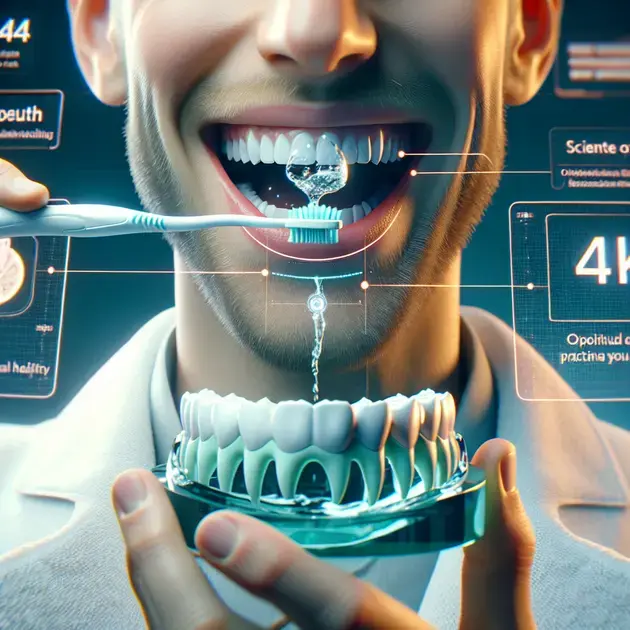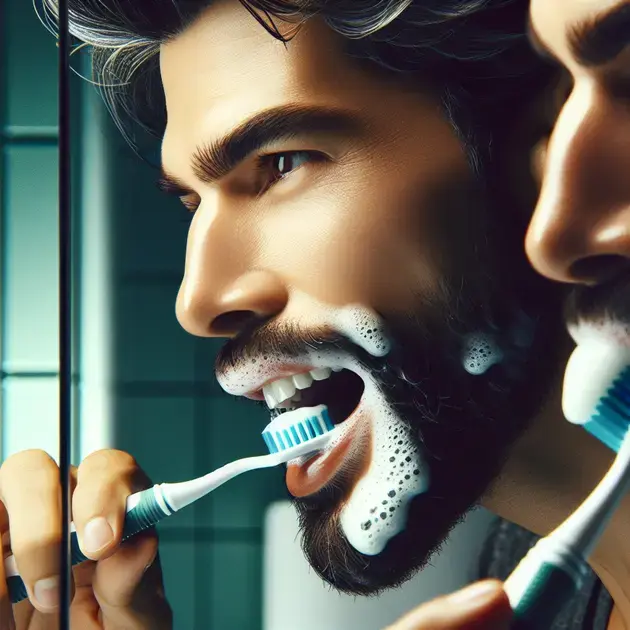When it comes to maintaining effective oral hygiene, one of the most crucial aspects is brushing our teeth regularly. The question that often arises is, “How long should we brush our teeth for optimal results?”
According to recent studies by dental professionals, the recommended time for brushing your teeth is at least two minutes each time. This ensures that all areas of the mouth are adequately cleaned, including those hard-to-reach spots where plaque tends to accumulate.

Tips for Effective Oral Hygiene
Effective oral hygiene is crucial for maintaining healthy teeth and gums. To ensure you are taking the right steps to care for your oral health, consider the following tips:
1. Brush Twice a Day
Brushing your teeth at least twice a day is essential for removing plaque and preventing cavities. Use a fluoride toothpaste and a soft-bristled brush to gently clean all surfaces of your teeth.
You can set a reminder on your smartphone using apps like Toothbrush Timer or Oral-B’s brushing app to keep track of your brushing routine.
Make sure to brush for at least two minutes each time, focusing on each quadrant of your mouth to ensure thorough cleaning.
2. Floss Daily
In addition to brushing, flossing daily is important for removing food particles and plaque from between your teeth. Use traditional floss or floss picks to clean between each tooth and along the gumline.
You can learn proper flossing techniques from the American Dental Association website or watch tutorials on YouTube for guidance.
Make it a habit to floss before brushing your teeth to ensure a comprehensive clean each time.
3. Use Mouthwash
Incorporating a fluoride or antiseptic mouthwash into your daily routine can help kill bacteria and freshen your breath. Swish the mouthwash around in your mouth for 30 seconds to a minute before spitting it out.
You can find recommended mouthwash brands and types on sites like Colgate or Crest’s official websites for optimal results.
Choose a mouthwash that addresses your specific oral health needs, such as cavity prevention or gum disease management.
4. Visit Your Dentist Regularly
Scheduling regular dental check-ups and cleanings is essential for maintaining good oral health. Your dentist can identify any issues early on and provide professional cleanings to remove hardened plaque (tartar).
Use platforms like Zocdoc or Healthgrades to find a reputable dentist in your area and book appointments conveniently online.
Follow your dentist’s recommendations for follow-up visits and any necessary treatments to ensure a healthy smile.

Optimizing Your Oral Health Routine
When it comes to optimizing your oral health routine, consistent habits and proper techniques are essential to maintaining a healthy mouth. By incorporating key practices into your daily routine, you can help prevent cavities, gum disease, and other oral health issues. Here are some steps to follow:
1. Brushing Your Teeth
Brushing your teeth at least twice a day is crucial for optimal oral health. Use a fluoride toothpaste and a soft-bristled toothbrush to gently clean all surfaces of your teeth. Make sure to brush for at least two minutes each time, reaching every tooth and focusing on the gumline.
Additionally, consider incorporating an antimicrobial mouthwash into your routine to help kill bacteria that can cause plaque and bad breath.
2. Flossing Daily
Flossing is an important step that should not be overlooked. It helps remove plaque and food particles from between your teeth that your toothbrush may miss. Be gentle when flossing to avoid damaging your gums, and make sure to floss every day to maintain healthy gums and prevent cavities.
3. Eating a Balanced Diet
Your diet plays a significant role in your oral health. Consuming foods high in sugar and acid can contribute to tooth decay and other issues. Opt for a balanced diet rich in fruits, vegetables, lean proteins, and whole grains. Drinking plenty of water also helps wash away food particles and keep your mouth hydrated.
4. Regular Dental Check-Ups
Visiting your dentist regularly is key to optimizing your oral health. Routine check-ups allow your dentist to detect any issues early on and provide professional cleanings to remove stubborn plaque and tartar. Follow your dentist’s recommendations for cleanings and check-ups to maintain a healthy smile.
The Science Behind Brushing Techniques
Understanding the science behind proper brushing techniques can help you improve your oral health and prevent common dental problems. By using the right method and tools, you can ensure that you are effectively removing plaque and bacteria from your teeth. Here are some insights into the science behind brushing techniques:
1. Angle of the Brush
The angle at which you hold your toothbrush plays a crucial role in cleaning your teeth effectively. Position the bristles at a 45-degree angle to the gumline to reach plaque hidden below the gumline. This angle allows the bristles to gently clean without causing damage to the gums.
2. Circular Motion
Using a circular motion when brushing helps dislodge plaque and food particles from the teeth. Instead of scrubbing back and forth, gently move the toothbrush in small circles to cover all surfaces of the teeth. This motion is more gentle on your teeth and gums while still being effective at cleaning.
3. Timing and Pressure
Brushing for at least two minutes each time allows you to thoroughly clean all areas of your mouth. Applying too much pressure while brushing can damage the enamel and gums, so be mindful of using gentle pressure. A soft-bristled toothbrush paired with the right technique can help you achieve a thorough clean without causing harm.
4. Tongue Cleaning
Don’t forget to clean your tongue as part of your brushing routine. Bacteria can accumulate on the surface of the tongue, leading to bad breath and oral health issues. Use a tongue scraper or your toothbrush to gently clean the surface of your tongue, starting from the back and moving forward.
Improving Your Dental Care Habits
Enhancing your dental care habits is essential for maintaining a healthy smile and preventing oral health problems. By making small changes to your routine, you can improve the overall health of your teeth and gums. Here are some tips for enhancing your dental care habits:
1. Proper Brushing Technique
Effective brushing technique involves using gentle, circular motions to clean all surfaces of your teeth. Pay attention to areas where plaque tends to build up, such as along the gumline and molars. Brush for at least two minutes to ensure a thorough clean.
2. Regular Replacement of Toothbrush
Replace your toothbrush every three to four months or sooner if the bristles show signs of wear. A worn-out toothbrush is less effective at cleaning your teeth and can harbor bacteria, leading to oral health issues. Keeping your toothbrush fresh helps maintain proper oral hygiene.
3. Limit Sugary and Acidic Foods
Consuming excessive sugars and acids can weaken tooth enamel and increase the risk of cavities. Limit your intake of sugary snacks and beverages, and rinse your mouth with water after consuming acidic foods to minimize their impact on your teeth. A balanced diet contributes to overall oral health.
4. Use Mouthwash and Dental Floss
Incorporate mouthwash and dental floss into your daily routine to enhance your dental care. Mouthwash helps kill bacteria and freshen breath, while flossing removes plaque and debris from between teeth. These additional steps complement brushing and contribute to a healthier mouth.
Conclusion
Optimizing your oral health routine is crucial for maintaining a healthy mouth and preventing common dental issues. By following key practices such as brushing your teeth at least twice a day with fluoride toothpaste, flossing daily, eating a balanced diet, and attending regular dental check-ups, you can enhance your oral health significantly. These habits help prevent cavities, gum disease, and ensure a healthy smile.
Understanding the science behind brushing techniques is essential for effective oral care. Techniques such as holding your toothbrush at a 45-degree angle, using a circular motion, brushing for at least two minutes, and cleaning your tongue are vital for removing plaque and bacteria. By incorporating these scientifically proven methods into your dental care routine, you can improve your overall oral health and reduce the risk of dental problems.
Enhancing your dental care habits with proper brushing techniques, regularly replacing your toothbrush, limiting sugary and acidic foods, and using mouthwash and dental floss further contributes to a healthier mouth. Making small adjustments to your routine can have a significant impact on the health of your teeth and gums, promoting long-term oral health and overall well-being.
